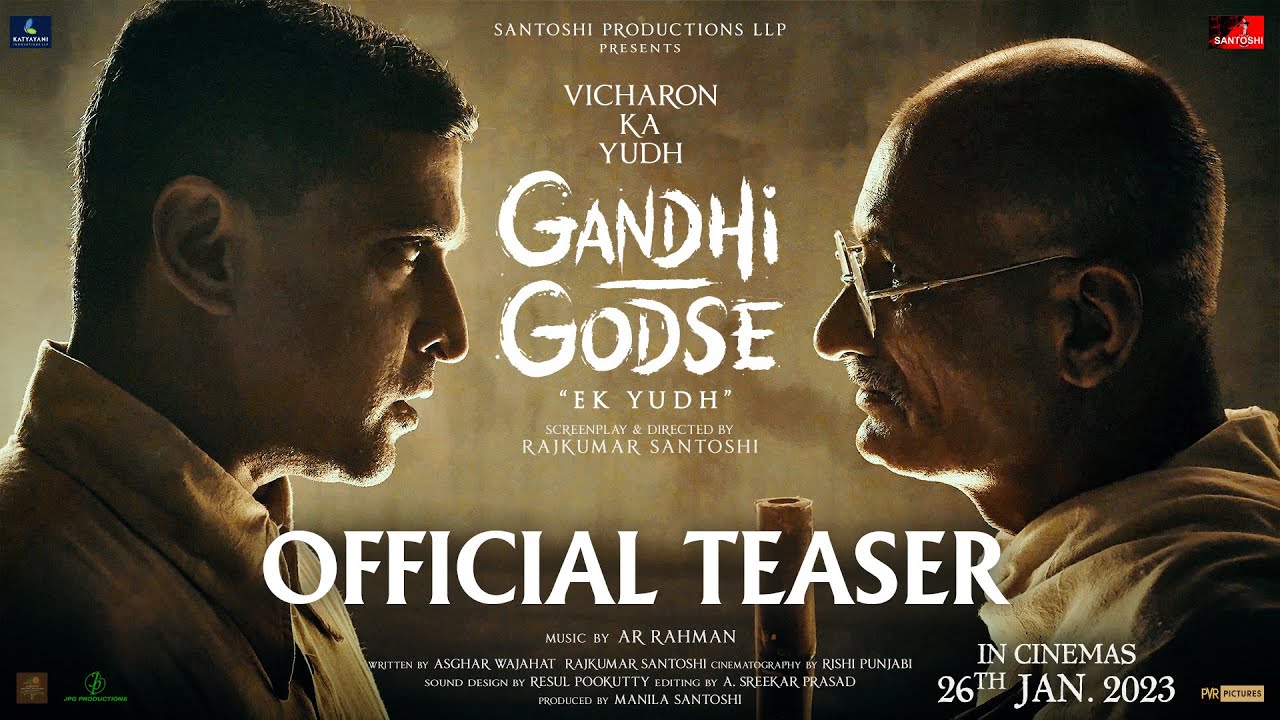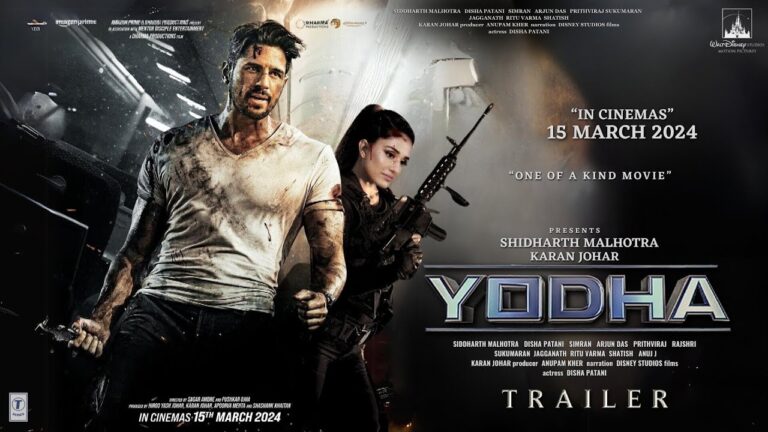Gandhi Godse – Ek Yudh Movie Review: Released in 2023, “Gandhi Godse – Ek Yudh” (Gandhi Godse – A War) is a controversial film that imagines a fictional meeting between Mahatma Gandhi and his assassin, Nathuram Godse. While the premise is intriguing, the film’s execution has divided audiences.
A Face-Off of Ideals: A Thought-Provoking Premise
The film’s core strength lies in its central conceit. Bringing Gandhi and Godse face-to-face allows for a fiery debate between their contrasting ideologies. Gandhi, the advocate for non-violence, and Godse, the nationalist who resorted to violence, engage in passionate arguments about the path to India’s freedom. This fictional encounter sparks conversation and compels viewers to re-evaluate their understanding of these historical figures.
Performances Fuel the Debate: Rajkumar Santoshi’s Vision
Veteran director Rajkumar Santoshi delivers a visually compelling film. The performances by Arun Singh (Gandhi) and Chinmay Mandlekar (Godse) are noteworthy. They convincingly embody their respective characters, capturing their intensity and conviction, making the ideological clash even more captivating.
Historical Accuracy vs. Creative License: A Blurred Line
One of the film’s major criticisms is its historical accuracy. The narrative takes significant liberties, portraying a fictional meeting that never happened. While creative license in filmmaking is acceptable, some viewers might find the historical inaccuracies distracting.
glorifying violence? A Delicate Balance
Another criticism the film faces is the potential for glorifying violence. By giving Godse a platform to voice his views, some argue that the film might legitimize his actions. The film attempts to showcase the complexities of his motivations, but the line between exploration and justification remains a point of contention.
Oversimplifying Complexities: Nuance Lost in Dialogue
While the film presents the clash of ideologies, the dialogues can feel overly simplistic at times. Nuances of Gandhian philosophy and the complexities of India’s freedom struggle aren’t fully explored. The focus remains on delivering powerful one-liners rather than fostering a deeper understanding of these historical figures.
A Missed Opportunity for Depth: Beyond Black and White
The film portrays Gandhi and Godse as polar opposites, a hero and a villain. This binary approach overlooks the complexities of both men. A more nuanced portrayal, exploring the shades of gray within their ideologies, could have made the film more impactful.
Emotional Manipulation: Evoking Sympathy for Godse?
The film attempts to evoke sympathy for Godse, portraying his motivations and frustrations with British rule. While this adds depth to his character, it might overshadow the gravity of his actions. The film could have done a better job of balancing empathy with a clear condemnation of violence.
eyond the Face-Off: Examining the Film’s Themes
“Gandhi Godse – Ek Yudh” delves deeper than just a fictional debate. Let’s explore the underlying themes it raises:
-
Freedom and its Price: The film compels viewers to question the means to achieve freedom. Is violence ever justified in the pursuit of liberation? The film doesn’t offer easy answers, forcing audiences to grapple with this complex issue.
-
The Legacy of Colonialism: The film subtly references the deep resentment and anger left behind by British rule. Godse’s frustration stems partly from this historical context, adding a layer of complexity to his motivations.
-
The Power of Forgiveness: While not explicitly explored, the film raises questions about forgiveness. Can Gandhi’s philosophy of forgiveness extend to someone like Godse who resorted to violence? This question lingers in the minds of viewers.
-
The Importance of Open Dialogue: Despite its flaws, the film promotes the importance of open dialogue. By bringing Gandhi and Godse together, even in a fictional setting, it encourages viewers to engage in healthy debate about historical narratives and opposing viewpoints.
Nuances Beyond Black and White: A Look at the Characters
While the film presents Gandhi and Godse as contrasting figures, there are glimpses of complexity:
-
Gandhi’s Limitations: The film doesn’t shy away from portraying potential limitations in Gandhi’s philosophy. His unwavering commitment to non-violence might be seen as unrealistic or impractical in certain situations.
-
Godse’s Frustrations: The film explores Godse’s frustrations with the perceived shortcomings of the non-violent movement. While his actions were wrong, understanding his motivations adds depth to the narrative.
Technical Execution: Creating a Visually Engaging Experience
The film’s technical aspects complement its thematic exploration:
-
Cinematography and Visual Style: The film employs contrasting visuals to represent Gandhi and Godse’s ideologies. Gandhi’s scenes are often bathed in warm light, while Godse’s are starker and more shadowed.
-
Background Score: The music effectively underscores the emotional intensity of the debates, without being overly dramatic.
A Missed Opportunity for Balance: The Film’s Legacy
“Gandhi Godse – Ek Yudh” had the potential to be a balanced exploration of contrasting ideologies. However, its focus on dramatic debates and the potential for misinterpreting the message limit its impact.
A More Nuanced Approach: Alternative Storytelling
Imagine a film that delves deeper into the historical context, exploring the complexities of India’s freedom struggle from multiple perspectives. It could showcase the rise of extremism alongside the non-violent movement, providing a richer understanding of both Gandhi and Godse’s motivations.
In Conclusion: A Catalyst for Critical Thinking?
“Gandhi Godse – Ek Yudh” is a provocative film that compels viewers to question their understanding of history. While its execution is flawed, it can spark important conversations about freedom, violence, and the legacy of colonialism. Ultimately, the film’s success lies in its ability to encourage critical thinking and open dialogue about these sensitive topics.
“Gandhi Godse – Ek Yudh” is a film that sparks debate but ultimately falls short of its full potential. The intriguing premise and strong performances are overshadowed by historical inaccuracies, a simplistic portrayal of complex ideologies, and the potential for misinterpreting the message.
A Starting Point for Discussion:
Despite its flaws, the film can act as a starting point for discussions about Gandhi, Godse, and the legacy of India’s freedom struggle. It encourages viewers to question their understanding of history and form their own opinions about these controversial figures.
Ultimately, whether “Gandhi Godse – Ek Yudh” is a thought-provoking exploration or a missed opportunity is a matter of individual interpretation.








+ There are no comments
Add yours